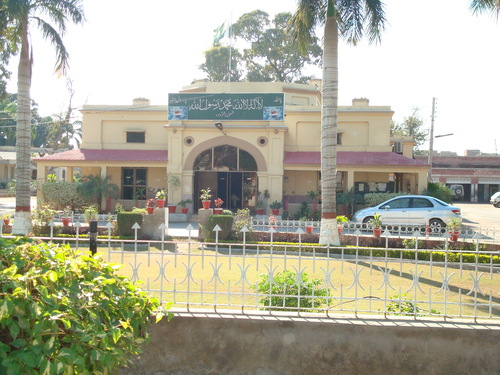|
Majeed Amjad
Majeed Amjad ( Punjabi, ur, ) (29 June 1914 – 11 May 1974) was an Urdu poet from Pakistan. One newspaper described him as a "philosophical poet of depth and sensitivity". His ghazals have also been sung by various Pakistani singers. Personal life Background Amjad was born on 29 June 1914 in Jhang, a small town in the Pakistani province of Punjab. He was taught by his maternal grandfather. Then for a few years he studied Arabic and Persian under the supervision of his maternal grandfather Noor Muhammad at a local mosque before enrolling in first grade in a government school. He obtained his Matriculation certificate in the first division from Islamia High School, Jhang. Two years later he completed his Intermediate exam, also in the first division from Government College, Jhang. Later he moved to Lahore for higher education that was not available in Jhang. He eventually received his bachelor's degree in 1934 from Islamia College Lahore. During the great depression economic ... [...More Info...] [...Related Items...] OR: [Wikipedia] [Google] [Baidu] |
Jhang
Jhang (Punjabi language, Punjabi, ur, ), ) is the capital city of Jhang District, in the central portion of the province of Punjab, Pakistan, Punjab, Pakistan. Situated on the east bank of the Chenab river, it is the List of most populous cities in Pakistan, 18th largest city of Pakistan by population. The historical name of the city and district is Jhang Maghiana. The locality also includes the Shrine (Darbar) of Pir Abdul Rehman hrine of Sultan Bahu and Heer and Ranjha's Tomb. Etymology The historical name of the city and district is Jhang Maghiana. The word Jhang is derived from the Sanskrit word ''jāṅgala'' which means rough or forested terrain, the word Jungle also sharing the same root. In context, the term Jhang was derived from the Sanskrit word ''jāṅgala,''. Jhang Maghiana was the historic name of the locality. History Greeks army led by Alexander encamped here in Jhang and stayed some time to make preparation to proceed ahead, several local tribes like ... [...More Info...] [...Related Items...] OR: [Wikipedia] [Google] [Baidu] |
Gojra
Gojra ( Punjabi and ur, ), the administrative capital of Gojra Tehsil, is the city of Toba Tek Singh District in the Punjab province of Pakistan. Gojra is from Faisalabad, from Lahore and north of Toba Tek Singh. Founded in 1896 during the British colonial period, Gojra was the commercial centre of lands which had recently come under cultivation, and was known for its "mandi" (market) for cash crops. It is the 50th largest city of Pakistan by population according to the 2017 census. History Pre-Independence Gojra city was established in 1896, when the colonisation of Faisalabad began. The railway line between Faisalabad and Gojra was laid in 1899. The town was given the status of notified area committee in 1904 and upgraded to a B-Class Municipality in 1925. In 1906, the population was 2,589. According to ''The Imperial Gazetteer of India,''"The business done in this rising mart on the railway, which has sprung into existence in the last six years owing to the extension o ... [...More Info...] [...Related Items...] OR: [Wikipedia] [Google] [Baidu] |
People From Sahiwal
A person ( : people) is a being that has certain capacities or attributes such as reason, morality, consciousness or self-consciousness, and being a part of a culturally established form of social relations such as kinship, ownership of property, or legal responsibility. The defining features of personhood and, consequently, what makes a person count as a person, differ widely among cultures and contexts. In addition to the question of personhood, of what makes a being count as a person to begin with, there are further questions about personal identity and self: both about what makes any particular person that particular person instead of another, and about what makes a person at one time the same person as they were or will be at another time despite any intervening changes. The plural form "people" is often used to refer to an entire nation or ethnic group (as in "a people"), and this was the original meaning of the word; it subsequently acquired its use as a plural form of per ... [...More Info...] [...Related Items...] OR: [Wikipedia] [Google] [Baidu] |



_1938.jpg)